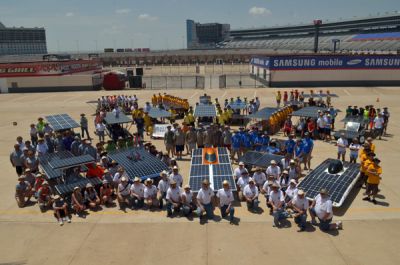2012 Solar Car Challenge underway in Dallas
 High school students from 24 schools across the US have converged at the Texas Motor Speedway in Dallas to race in the annual 2012 Solar Challenge. The students are participating in the educational race to see which team can complete the most laps around the speedway over a four-day period.
High school students from 24 schools across the US have converged at the Texas Motor Speedway in Dallas to race in the annual 2012 Solar Challenge. The students are participating in the educational race to see which team can complete the most laps around the speedway over a four-day period.
The event, which is organized by Solar Car Challenge Foundation President Dr. Lehman Marks, began in 1993, as an extra curriculum activity at The Winston School where Marks was head of science. Since then it’s grown to a national competition. “The purpose is to try to help motivate high school students in science, engineering and technology,” Marks said. Under the program students engineer, fund, design, and ultimately build a photovoltaic car to compete in the annual event, which alternates between competing on the race-track and a race across states.
The program has proven popular, according to Marks. “2013 is the 20th year. Right now we have 85 schools building and designing and working on solar cars,” he said. “Over 400 schools are wait-listed for the program.”
This year’s competition has three categories: the classic division, which is for the newest teams; the open division, which is for teams with more advanced motors and PV modules; and the advanced division for teams with the most advanced batteries motors and PV modules, according to Marks.
Over the years the cars have been able to maintain higher speeds. “One was averaging 56 miles an hour yesterday. Most cars will run about 35 miles an hour,” Marks said. The fastest vehicle by the Choctaw Central High School of Choctaw, Mississippi, is in the advanced category. The team, based on the Choctaw Reservation, plans to enter the world’s biggest solar car challenge, the World Solar Challenge, in 2013. That race takes place across Australia’s punishing outback.
Still, there’s a stark difference between the World Solar Challenge, college solar car races and the Solar Car Challenge. The others are bigger events with their own medical professionals on hand and big companies providing sponsorship. "We provide medical and security services to all of the teams taking part in our event; no other programs do this. We provide meals, water, and sports drinks to all of the teams taking part in our event; no other programs do this. We teach students the importance of funding their own project," said Marks. "We teach high school students how to build solar cars through our year around education program," he added.
Under this program there is national sponsorship, but students must also find funding on their own anyway they can and the foundation provides them with one square meal a day. Prior to that some of the teams would try to survive on peanut butter and jelly sandwiches, cereal and far too few fluids while competing on tarmac that could reach 150 degrees, Marks said.
With the demand for entries the Solar Car Challenge is likely to grow. To accommodate the larger number of entrants, future events will consist of regional events with winners advancing to a national event, according to Marks.



